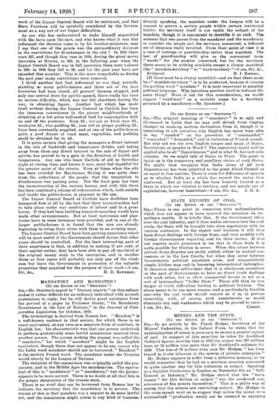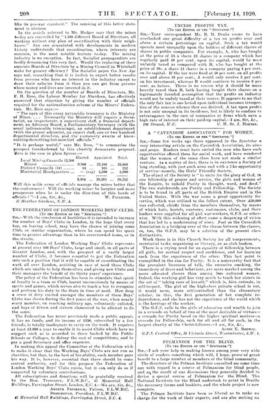MINERS AND THE STATE.
[To THE EDITOR Or THE " SPECTATOR.") Sie.—In an article by Mr. Frank Hodges. Secretary of the Miners' Federation, in the Labour Press, he states that the nationalization of mines is necessary to secure a greater output of coal. In support of this assertion he takes Sir Auckland Geddes's figures showing that in 1913 the output was 287 million tons, or 70 million tons more than Sir Auckland's estimate for 1920. This loss of 70 million tons, says Mr. Hodges, " has been traced to faults inherent in the system of private enterprise."
Mr. Hodges appears to suffer from a defective memory, or he would remember that he had on a previous occasion accounted in quite another way for this reduction in output. Speaking at a Socialist Conference in London on November 6th on " Self- Control in Industry," Mr. Hodges stated that the "main reason " for this decline in output " was the awakened con- sciousness of the miners themselves." This is a polite way of saying that the miners are restricting output. Mr. Hodges in the same speech went on to suggest that unless the mines were nationalized " production would not be restored to anything
like its pre-war standard." The meaning of this latter state- ment is obvious.
In the article referred to Mr. Hodges says that the mines to-day are controlled by "1,500 different Board of Directors, all working without any plan of co-ordination with their neigh- bours." Any one acquainted with developments in modern history understands that co-ordination, where interests are common, is the most notable feature to-day. The mining industry is no exception. In fact, Socialist propagandists are loudly denouncing this very fact. Would the replacing of these separate Boards of Directors by a Mining Council in Whitehall make for greater efficiency ? The Socialist paper the New Age says not, remarking that it is foolish to expect better results from persons who have no interest in the industry except to draw their salaries from it than you can get from persons whose Money and lives are invested in it.
On the question of the number of Boards of Directors, Mr. F. H, Rose, the Labour Member for Aberdeen, has effectively answered that objection by giving the number of officials required for the nationalization scheme of the Miners' Federa- tion. Mr. Rose says:- " The apex of this crazy pyramidic trumpery is the Ministry of Mines. . . . Necessarily the Ministry will require a Secre- tariat, an inspectorate, a supervisory staff, a financial depart- ment, an Advisory Board, a Parliamentary Secretary (with the usual indispensable trimmings), an establishment department (with the proper adjuncts), an expert staff, one or two hundred departmental directors, and the customary swarm of know- nothing-do-nothing-but-mischief officials."
"It is perhaps useful," says Mr. Rose, " to summarize the prospect foreshadowed by this chastely democratic proposal. Mere is the case in plain figures :-
Elected. Appointed. Total.
Local Mining Councils (3,300
Mines) 9,900 ... 23,100 ... 33,000 District Councils (14) 84 ... 163 ... 252 Ministerial Headquarters — (say) 5,000 ... 5,000
9,984 ... 28,263 ... 38,252 Will this noble army of officials manage the mines better that the coal-owners ? Will the working miner be happier and more prosperous when he is under the direction of this horde of



































 Previous page
Previous page